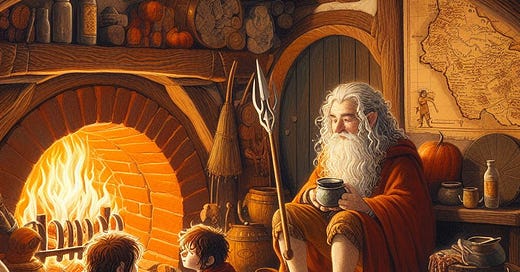The Fellowship moved cautiously through Moria’s silent halls, the weight of death thick in the air. Pippin, ever curious, lingered near an ancient well. A skeletal hand clutched a rusted helmet—too tempting to ignore. He reached out, just to see—then fumbled.
Clang.
The helmet tumbled down the well, striking the walls again and again, its echoes stretching into the abyss. The final thud landed like a death knell.
Gandalf turned, eyes dark with fury. "Fool of a Took!" He rapped Pippin’s head with his staff. "Throw yourself in next time and rid us of your stupidity!"
Pippin flushed, shame tightening his throat.
Then, from the deep:
Doom.
Doom.
A slow, distant drumbeat. The silence was broken. The enemy had been alerted.
This moment in The Lord of the Rings is striking because it shows Gandalf, the wise wizard, the supposed paragon of patience and composure, losing his temper. You could argue that Gandalf embodies the Stoic ideal—the sage who offers guidance, wisdom, and foresight. Yet here, he snaps. He smacks Pippin, calls him a fool, and displays frustration.
So, what do we make of this? If Gandalf is the wise old figure we aspire to be, why does he break from that ideal?
The Grandfather vs. The Father
If we think of wisdom and stoicism as embodied in an elder figure, it’s often someone like a grandfather—calm, patient, slow to anger. Grandparents tend to be forgiving, knowing that life is long and that small mistakes aren’t the end of the world. They let things slide. They slip their grandchildren candy when the parents aren’t looking. They offer guidance without the intensity of immediate responsibility.
But before you can become a grandfather, you must first be a father
.
Fathers (and parents in general) are different from grandparents because they are deeply involved in the daily development of their children. They discipline. They set rules. They get frustrated because they are directly responsible for molding their children into functioning adults. The stakes feel higher because they are.
A father might scold a child for throwing a tantrum in public, while a grandfather might chuckle and say, “They’ll grow out of it.” The difference? Perspective. Distance. The grandfather has already raised children. The father is in the thick of it.
Gandalf as the Grandfatherly Figure
For most of the journey, Gandalf is the wise, composed leader—the grandfatherly figure of the Fellowship. He dispenses wisdom, guides the group, and stays calm in the face of danger. But in moments like Moria, when the stakes are high and the margin for error is razor-thin, he descends into fatherhood. He is directly responsible for the safety of the group, and Pippin’s blunder could have gotten them all killed.
In that moment, he reacts as a father would: swiftly, emotionally, even harshly. He doesn’t have the luxury of distance; he’s in the middle of the fight.
The Stoic Ideal and Real-World Wisdom
This raises an important question: Is true wisdom about never losing your temper? Or is it about understanding when emotions, even frustration, serve a purpose?
Stoicism teaches detachment from emotions, but even the greatest figures in history—real and fictional—have their moments of weakness. Even Christ, in the Christian tradition, cried out in despair on the cross. Even the most composed individuals have breaking points.
What matters is what happens after. Do you dwell on your loss of composure, or do you move forward? Do you learn from it? Do you recognize that being in the thick of life, whether as a leader, a parent, or someone navigating difficult times, means there will be moments where you fall short of your own expectations?
Gandalf doesn’t dwell. He doesn’t apologize. He doesn’t beat himself up. He simply moves forward.
The Lesson for Us
We often hold ourselves to impossible standards. We want to be the wise, calm, unshakable figure all the time. But the reality is, most of us are still in the father stage of our journey. We are involved, responsible, making decisions that have immediate consequences. We are going to get frustrated. We are going to lose our patience. And that’s okay.
Because, with time, experience, and perspective, we inch closer to that grandfatherly wisdom—the ability to see the bigger picture, to let go of the small things, to know that not every mistake is catastrophic.
Until then, we do our best. We aim high. We try to be Gandalf at his wisest. But when we fail, we don’t need to beat ourselves up.
Even the best among us lose their temper sometimes.
Even Gandalf.
***If you’d like to become a paid member but cannot afford it, feel free to contact me directly; I’ll happily provide a complimentary membership (no questions asked).
Stay Connected
Brandon Tumblin is most well-known for his podcast, The Strong Stoic Podcast, where he discusses philosophical ideas (solo and guest episodes).
Brandon is also a writer for THE STOIC, the official journal of The Stoic Gym.




